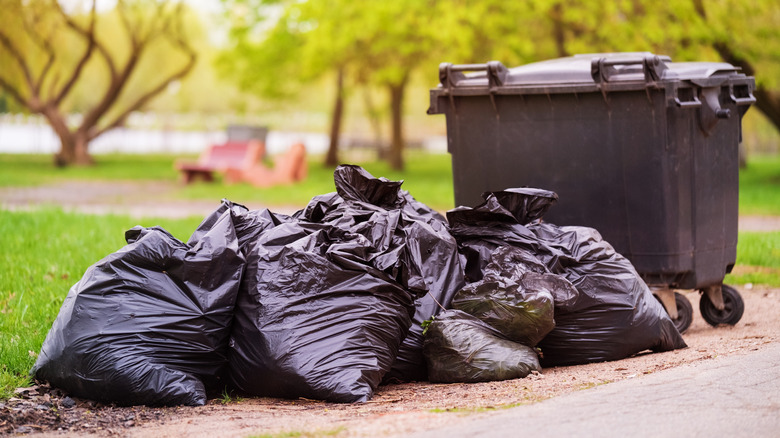Are You Able To Do Anything If Your Neighbor's Trash Is Piling Up? Here's The Deal
Living next door to a neighbor whose trash is constantly spilling out of bins or piling up on their property (or yours) can become a huge headache. This isn't just about the occasional missed trash pickup; we're talking about accumulation that is a noticeable and persistent blight, even if you've offered to bring in your neighbor's trash can. When discussing what constitutes legitimate trash in a situation like this, it refers to anything considered discardable waste material, including household refuse like food scraps, packaging, broken items, and yard waste. And in a legal (or at least community) sense, an issue arises when these items are not properly contained or disposed of, especially if they begin to create a nuisance that impacts others. Fortunately, you absolutely do have some recourse.
The dangers associated with continual, heavy trash pileups go beyond just aesthetics and foul odors. A growing pile of garbage can quickly become a health and safety hazard. Food waste and damp materials can attract tons of pests, including rats, mice, raccoons, and insects like flies and cockroaches to your property. Furthermore, stagnant trash often becomes a breeding ground for bacteria and mold, posing potential respiratory risks. In severe cases, large amounts of discarded junk can even pose a fire hazard, depending on the contents, like an old and broken lawnmower. It's important to recognize that an issue with a neighbor's trash can move beyond a personal preference and enter the realm of public health and local code violations. Understanding these risks is the first step to knowing why you shouldn't just ignore the problem.
What are your options for solving a neighbor's trash issues
As previously mentioned, yes, there are legal steps you can take regarding your neighbor's trash piling up, especially if it is negatively affecting your property or even the larger community. The first, and often best, course of action is to try an approachable, friendly conversation. Your neighbor may simply be unaware of the severity of things or be dealing with a temporary hardship. Keep the conversation focused on the impact (e.g., "I've noticed a lot of flies lately," or "The wind often blows loose debris into my yard") rather than starting directly with a personal attack. You can also follow that up with a letter addressing your concerns, or volunteering (with their consent) to clean it up yourself, and use your local curbside pickup day. If direct conversation or help isn't possible, or if it doesn't resolve the issue, you should escalate.
In nearly every municipality, garbage accumulation falls under public health codes or zoning ordinances, so the most effective action at that point is appealing to the appropriate authorities. First, contact your local code enforcement office, sanitation department, or HOA, if you have one. These agencies have the authority to investigate the complaint, determine if a violation exists, and issue official warnings or citations. When filing a complaint, be prepared to document the situation with dated photographs and a clear description of how the trash impacts you. By doing all this, you ensure the problem is addressed through legal and regulatory means. Taking proactive steps through official channels is the most diplomatic way to resolve a persistent trash problem, especially when dealing with difficult neighbors, and restore peace to your property.

